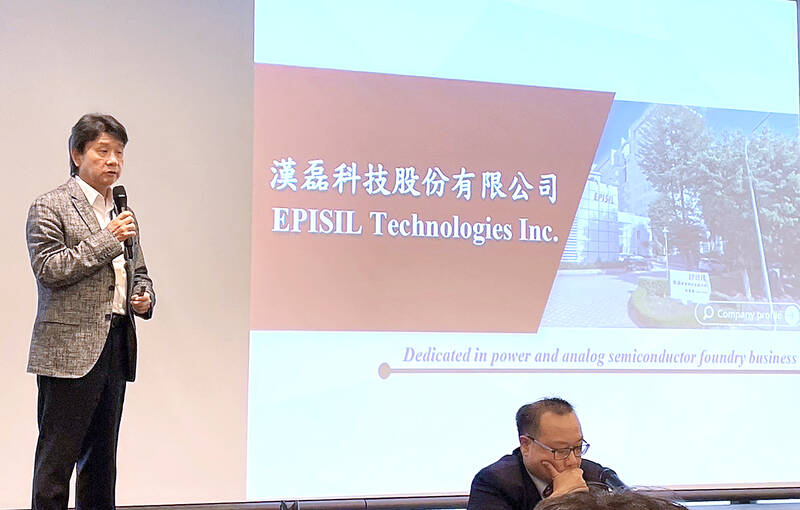Compound semiconductors maker Episil Technologies Inc (漢磊科技) yesterday said it aims to work with Vanguard International Semiconductor Corp (世界先進) to expand production of 8-inch silicon carbide wafers to an economic scale and strive to gain orders from global customers such as Japan’s Renesas Electronics Corp and Denso Corp.
The two firms on Tuesday signed an agreement to produce 8-inch silicon carbide wafers at a 6-inch fab operated by Episil. Vanguard also agreed to acquire a 13 percent stake in Episil for NT$2.48 billion (US$77.25 million).
Six-inch wafers remain a mainstream product in the silicon carbide market, but 8-inch wafers are expected to catch up in the next one to two years, Episil chairman Shyu Jann-hwa (徐建華) told investors.

Photo: CNA
The company’s move follows the step of major chipmakers such as Infineon Technology AG of Germany, which has opened a new 8-inch fab in Malaysia to produce silicon carbide wafers.
“We are optimistic about long-term demand for silicon carbide, although there is an oversupply, which we consider as a short-term issue,” Shyu said.
“With the use of silicon carbide gradually spreading from electric vehicles to home appliances, industrial devices and artificial intelligence data centers, it creates good business opportunities for foundry companies,” Shyu added.
Episil has failed to obtain orders from several global integrated-device manufacturers (IDM) as it lacks capacity, Shyu said.
The collaboration with Vanguard would help overcome this problem, he said, adding that the move is cost-efficient compared with building a new fab.
The 8-inch fab would operate a pilot line with a monthly capacity of 1,500 wafers before expanding to about 10,000 wafers over the next few years depending on customer demand, he added.
Episil is targeting Japanese IDMs such as Renesas Electronics, Denso and Toshiba Corp as potential customers, the company said.
Episil’s revenue in the first half of the year dropped 20.23 percent year-on-year to NT$2.94 billion as customers struggled with inventory issues, with silicon-based revenue tumbling 32 percent due to sagging demand from automotive and consumer electronics segments.
The company recorded a NT$212.28 million loss in the first half of the year, compared with a net profit of NT$91.94 million during the same period last year.
Episil swung into a loss of NT$0.64 per share in the first 6 months of this year, from earnings of NT$0.28 per share a year ago.
The company’s factory utilization rate would remain lower than 50 percent in the second half of this year, which would continue weighing on its gross margin because of higher depreciation costs from idled equipment, it said.
Gross margin dropped to 0.15 percent in the first half from 12.66 percent a year earlier.
The company expects business to improve in the fourth quarter thanks to stabilizing wafer pricing and an increase in customer demand, it said.
Wafer prices have fallen more than 30 percent since the beginning of this year, it added.

When an apartment comes up for rent in Germany’s big cities, hundreds of prospective tenants often queue down the street to view it, but the acute shortage of affordable housing is getting scant attention ahead of today’s snap general election. “Housing is one of the main problems for people, but nobody talks about it, nobody takes it seriously,” said Andreas Ibel, president of Build Europe, an association representing housing developers. Migration and the sluggish economy top the list of voters’ concerns, but analysts say housing policy fails to break through as returns on investment take time to register, making the

‘SILVER LINING’: Although the news caused TSMC to fall on the local market, an analyst said that as tariffs are not set to go into effect until April, there is still time for negotiations US President Donald Trump on Tuesday said that he would likely impose tariffs on semiconductor, automobile and pharmaceutical imports of about 25 percent, with an announcement coming as soon as April 2 in a move that would represent a dramatic widening of the US leader’s trade war. “I probably will tell you that on April 2, but it’ll be in the neighborhood of 25 percent,” Trump told reporters at his Mar-a-Lago club when asked about his plan for auto tariffs. Asked about similar levies on pharmaceutical drugs and semiconductors, the president said that “it’ll be 25 percent and higher, and it’ll

CHIP BOOM: Revenue for the semiconductor industry is set to reach US$1 trillion by 2032, opening up opportunities for the chip pacakging and testing company, it said ASE Technology Holding Co (日月光投控), the world’s largest provider of outsourced semiconductor assembly and test (OSAT) services, yesterday launched a new advanced manufacturing facility in Penang, Malaysia, aiming to meet growing demand for emerging technologies such as generative artificial intelligence (AI) applications. The US$300 million facility is a critical step in expanding ASE’s global footprint, offering an alternative for customers from the US, Europe, Japan, South Korea and China to assemble and test chips outside of Taiwan amid efforts to diversify supply chains. The plant, the company’s fifth in Malaysia, is part of a strategic expansion plan that would more than triple

Taiwanese artificial intelligence (AI) server makers are expected to make major investments in Texas in May after US President Donald Trump’s first 100 days in office and amid his rising tariff threats, Taiwan Electrical and Electronic Manufacturers’ Association (TEEMA, 台灣電子電機公會) chairman Richard Lee (李詩欽) said yesterday. The association led a delegation of seven AI server manufacturers to Washington, as well as the US states of California, Texas and New Mexico, to discuss land and tax issues, as Taiwanese firms speed up their production plans in the US with many of them seeing Texas as their top option for investment, Lee said. The